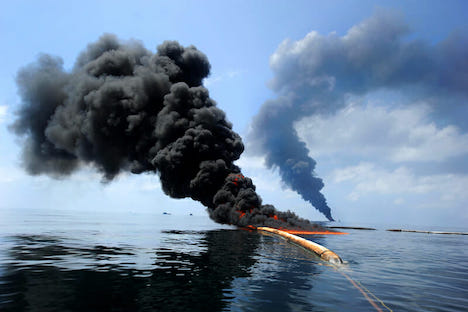The Oil Spill You’ve Never Heard of May Rival BP
 Print This Print This
By Ilana Novick | Truthdig
Truthdig
Thursday, Oct 25, 2018
 |
| The 2010 BP oil spill, which occurred six years after an ongoing discharge from a Taylor Energy Co. platform began in the Gulf of Mexico. (U.S. Navy photo by Mass Communication Specialist 2nd Class Justin Stumberg / Released) |
In the world of major environmental disasters, the 2010 explosion on BP’s Deepwater Horizon oil rig grabbed a lot of media attention. It’s understandable; the explosion killed 11 people, spilled millions of gallons of oil into the Gulf of Mexico, and economically paralyzed communities along the Gulf Coast. However, as CNN reports Tuesday, another Gulf Coast spill, which started six years before Deepwater Horizon, may be brewing into something even worse.
The Taylor oil spill, caused by a leak from oil company Taylor Energy Co.’s platform, began pumping oil into the Gulf of Mexico in 2004. “By some estimates,” CNN writes, “the chronic leak could soon be larger, cumulatively, than the Deepwater disaster, which dumped up to 176.4 million gallons (or 4.2 million barrels) of oil into the Gulf.” Worse, that amount “would also make the Taylor spill one of the largest offshore environmental disasters in U.S. history.”
A Department of Justice investigation in September revealed previous claims submitted by the Taylor Energy Co., which owns the platform, and compiled by the Coast Guard drastically underestimated the spill.
Investigators don’t know exactly how much oil has been spilled into the Gulf at the Taylor site. According to The Washington Post, “Between 300 and 700 barrels of oil per day have been spewing from a site 12 miles off the Louisiana coast since 2004, when an oil-production platform owned by Taylor Energy sank in a mudslide triggered by Hurricane Ivan.”
CNN adds that “an estimate from SkyTruth, a satellite watchdog organization, put the total at 855,000 to 4 million gallons by the end of 2017. If you do the math from the DOJ’s filing, the number comes out astronomically higher: More than 153 million gallons over 14 years.”
Residents and business owners in the area weren’t informed of the spill by government officials. Per CNN, “According to local activists, the warnings didn’t come from the Coast Guard, the government, or any oil company. They came from people around the Gulf community who simply saw it with their own eyes.”
The Post observes that the spill is largely unknown outside Louisiana because of Taylor’s efforts to keep it that way. In fact, “The spill was hidden for six years before environmental watchdog groups stumbled on oil slicks while monitoring the BP Deepwater Horizon disaster a few miles north of the Taylor site in 2010.” Environmental advocacy groups sued Taylor in 2012, in Apalachicola Riverkeeper v. Taylor, eventually settling in 2015.
The company declined to comment to both CNN and the Post, though it has previously disputed in court the amount of oil spilled.
There doesn’t seem to be an end in sight, and President Donald Trump’s plans may only make it worse. The Post explains:
As oil continues to spoil the Gulf, the Trump administration is proposing the largest expansion of leases for the oil and gas industry, with the potential to open nearly the entire outer continental shelf to offshore drilling. That includes the Atlantic coast, where drilling hasn’t happened in more than a half century and where hurricanes hit with double the regularity of the Gulf.
Source URL
|
 Print This Print This

|

